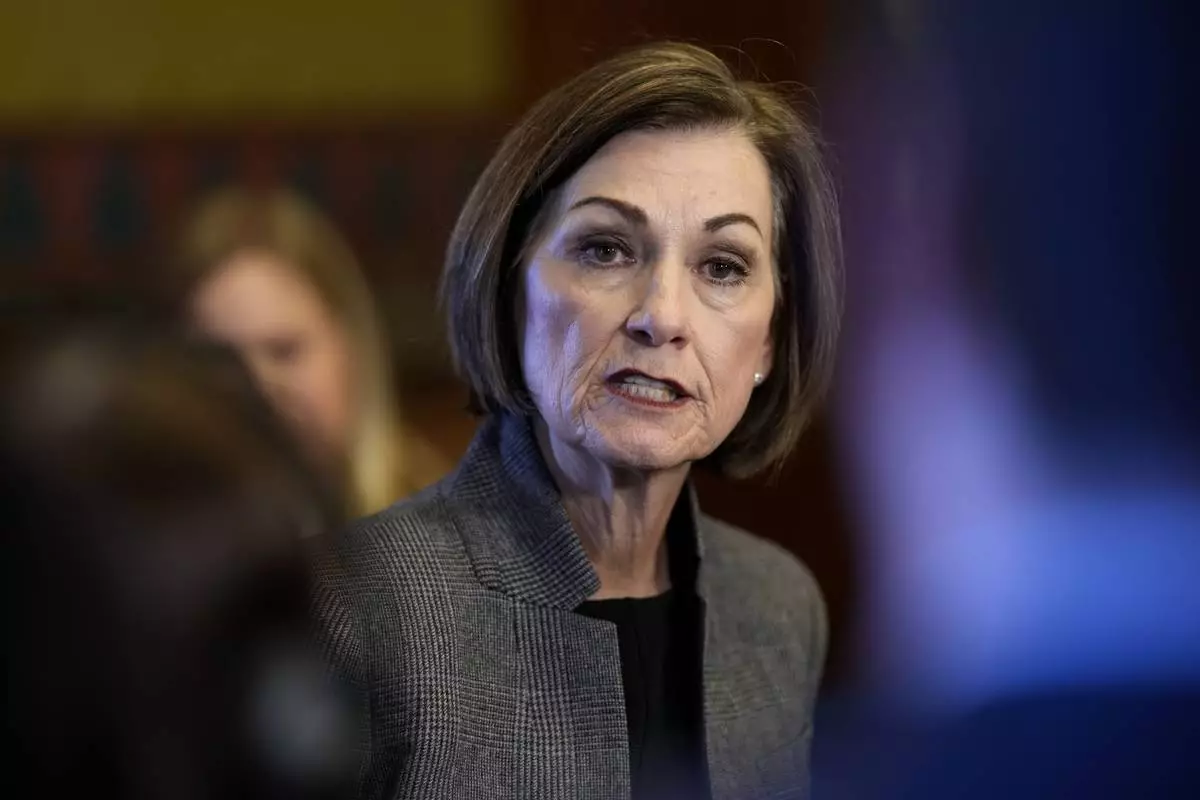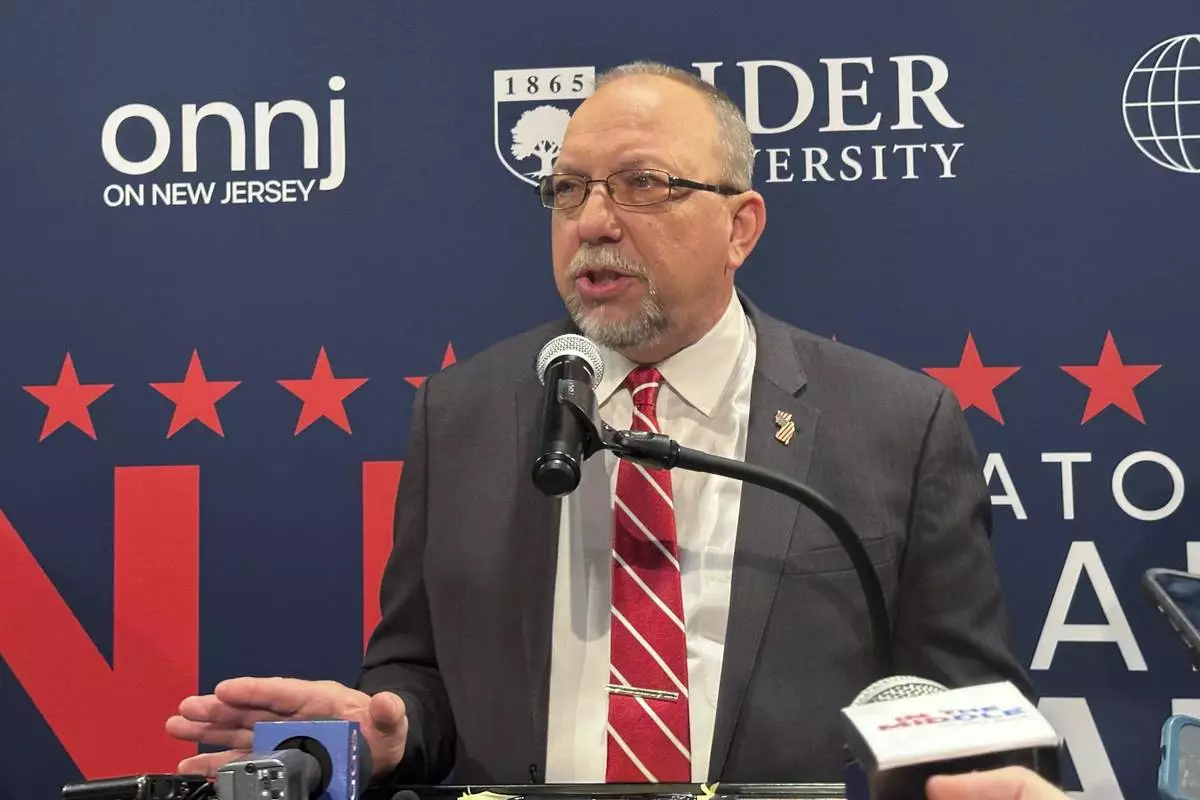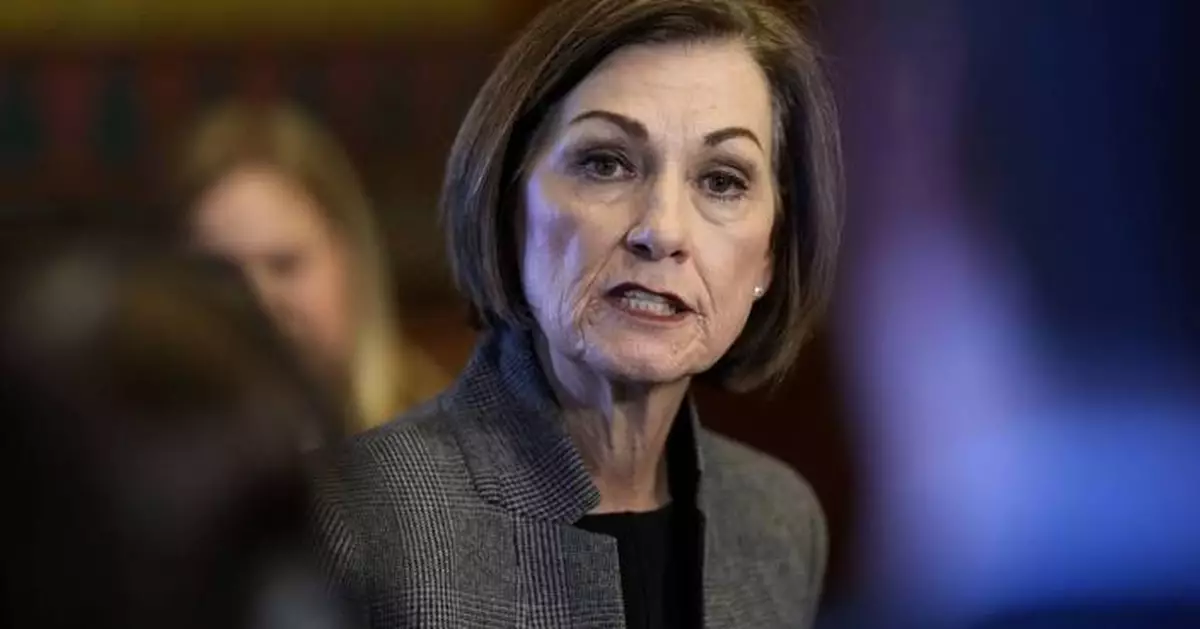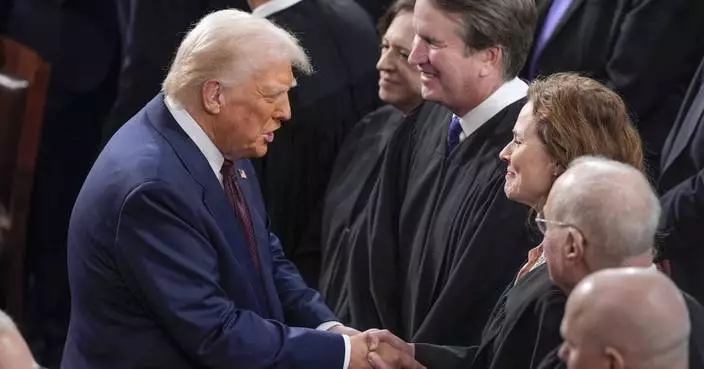DES MOINES, Iowa (AP) — Iowa cannot, for now, continue to enforce part of its book ban law, a federal judge said Tuesday, giving major publishers that sued the state the second temporary reprieve they requested.
The new decision from U.S. District Judge Stephen Locher again temporarily blocked the part of the law that prohibits school libraries and classrooms from carrying books that depict sex acts.
The law was first approved by Iowa’s Republican-led Legislature and GOP Gov. Kim Reynolds in 2023, but key parts, including the book ban, were temporarily blocked by Locher before they became enforceable. That decision was overturned in August by the U.S. Eighth Circuit Court of Appeals, meaning the law has been enforceable in the current school year.
The appellate court told the lower court that it failed to apply the correct analysis in determining whether to temporarily block the law. In his decision Tuesday, Locher stated that the unconstitutional applications of the book restrictions “far exceed” the constitutional applications "under both legal standards the Court believes are applicable."
Expecting an appeal, Locher also included an alternative standard through which the restrictions could be considered constitutional. However, he added he does not believe it should be applied in this case.
In a statement Tuesday night, Iowa Attorney General Brenna Bird said parents should not have to worry about the books their kids can access in schools.
“This common sense law makes certain that the books kids have access to in school classrooms and libraries are age-appropriate,” Bird said. “I’m going to keep on fighting to uphold our law that protects schoolchildren and parental rights.”
The lawsuit was brought by the Iowa State Education Association, major publishing houses and bestselling authors, including John Green and Jodi Picoult. They argued that the law was overly broad and age indifferent, reaching “far beyond obscenity to prohibit any book with any description of a sex act for any age,” the complaint stated.
The state's defense has maintained that the law clearly outlines explicit descriptions of sex acts. And arguing before Locher in February, the attorney representing Iowa said the state, in its mission of educating children, has legitimate reason to ensure public school materials are appropriate.
The publishers and authors countered that while advancing the school mission is one purpose of school libraries, it’s not the sole purpose and school libraries are places of voluntary learning.
In his decision, Locher said the law “does not regulate student speech or constitute ‘government speech’ but instead tries to impose statewide restrictions on what has traditionally been the prerogative of local officials regarding the contents of school libraries.”
In addition to the book ban, the law forbids educators from raising gender identity and sexual orientation issues with students through grade six, and school administrators are required to notify parents if students ask to change their pronouns or names.
Iowa’s measure was enacted amid a wave of similar legislation around the country, driven by Republican lawmakers, to prohibit discussion of gender and sexual orientation issues and restrict the use of restrooms in schools. Many of those laws prompted court challenges.
In Iowa, a second lawsuit, filed by LGBTQ+ advocacy organization Iowa Safe Schools and several youth, additionally contests the provisions of the law prohibiting K-6 instruction related to sexual orientation and gender identity. A separate decision from Locher is expected to follow.

FILE - Iowa Gov. Kim Reynolds speaks during a news conference at the Statehouse in Des Moines, Iowa, Jan. 31, 2024. (AP Photo/Charlie Neibergall, File)
TRENTON, N.J. (AP) — The most important Republican in New Jersey's race for governor this year might well be a part-time resident of Bedminster who burnished his reputation and his brand near the Atlantic City Boardwalk.
“Donald Trump is the X factor in this GOP primary,” said Ben Dworkin, director of the Rowan Institute for Public Policy & Citizenship. “His endorsement right now could make or break, depending on to whom he gives it.”
But in a state that has long leaned Democratic, the president's endorsement in the June 10 primary could complicate things in a general election, where the winner of a six-person Democratic field awaits.
That may explain why one Republican candidate, state Sen. Jon Bramnick, has criticized Trump over his pardons for those involved in the Jan. 6, 2021, riot at the U.S. Capitol, and why two other leading contenders have sought the president's support without much fanfare.
Still, in one of only two states with a race for governor this year — Virginia is the other — the general election will be closely watched for clues about whether blue state voters have been won over or repelled by Trump’s leadership. Trump, who built his brand as an Atlantic City casino owner and still owns property in New Jersey, including the Bedminster golf club, narrowed the margin between 2020 and 2024 but still lost the state, and Democrats maintain firm control.
Some Republicans think that's changing.
The GOP field dwindled from five candidates to four this past week when Ed Durr, a former state senator and vocal Trump supporter, dropped out. Durr made national news in 2021 when he shocked state Senate President Steve Sweeney, a Democrat, by winning in their southern New Jersey district. A furniture truck driver new to elected office, Durr said in a statement he was ending his campaign so radio host and fellow Trump supporter Bill Spadea could defeat “never Trumpers” in the race.
Both Spadea and Jack Ciattarelli, the 2021 GOP nominee for governor who lost by roughly three percentage points to term-limited Democratic Gov. Phil Murphy, have said critical things of Trump in the past, but both have embraced him lately.
Ciattarelli met with the president last week. Chris Russell, his campaign strategist, declined to discuss details of the meeting, but said Ciattarelli welcomes the president’s support if he should give it. A message seeking comment was left with Spadea’s campaign.
Mario Kranjac, the former two-term mayor of the suburban New York City town of Englewood Cliffs and a recent entrant into the race, said he thinks he is the most Trump-aligned candidate because he never wavered in his support for Trump during the president's first term.
“The residents and citizens and taxpayers of New Jersey need a governor with fixed values and beliefs, and that’s me -- in terms of everything that I stand for and that President Trump stands for,” he said in a phone interview. “They shouldn’t have to worry that when something happens, their candidate is going to abandon President Trump, which I would never do.”
Part of the challenge for Republicans is that the value of Trump's support is a moving target. The first two months of his second term as president may have alienated some voters but won others over. Anticipating how much value Trump could add to the campaign when voters cast their primary ballots is guesswork, with circumstances changing by the day.
In the pre-Trump era, some Republicans successfully navigated the shoals between the primary and the general elections. While Republicans have not won a U.S. Senate seat in New Jersey in more than five decades, they have enjoyed more success in governor's races. The last three Republicans elected governor — Thomas Kean Sr., Christine Todd Whitman and Chris Christie — all won two consecutive terms. But their brand of politics included business-friendly conservatism, hardly the same as Trump's aggressive populism.
Democrats remain the dominant party in the state, but some Republicans say that hold is slipping. Russell, Ciattarelli’s strategist, points to the registration gains the GOP has made, shaving the Democrats’ advantage from 1 million more voters to 834,000 more.
He said Democrats should not be overconfident in their traditional advantages.
“I think they’re missing the lesson of the 2024 election in New Jersey, which is Donald Trump did exceedingly well in New Jersey,” he said.
The weight of Trump’s influence lingers as one of the lessons the GOP took from 2024. That much seemed evident in Durr's withdrawal from the race.
In his statement announcing the decision, Durr said he was ending his campaign so Spadea could prevail. Soon after, Durr said his statement was not actually an endorsement. Steve Kush, a Durr spokesperson, explained the distinction and, in the process, reflected who the big dog is in the primary.
“He doesn’t want to use the word endorse because he doesn’t want to get ahead of President Trump,” Kush said.

FILE - Former state senator Ed Durr speaks following the first Republican debate, Feb. 4, 2025, at Rider University in Lawrenceville, N.J. (AP Photo/Mike Catalini, File)

FILE - Republican presidential nominee former President Donald Trump walks after a news conference at Trump National Golf Club, Aug. 15, 2024, in Bedminster, N.J. (AP Photo/Julia Nikhinson, File)




















































